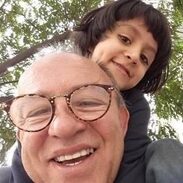 It is perhaps ironic that I wish to devote my life to marriage and family therapy, since I have been living alone for the past 10 years, my most formative period, with all of my family back in my native Japan. But I know exactly why it is. It comes from my reflection upon where I have come from, my own struggle and that of my family.
It is perhaps ironic that I wish to devote my life to marriage and family therapy, since I have been living alone for the past 10 years, my most formative period, with all of my family back in my native Japan. But I know exactly why it is. It comes from my reflection upon where I have come from, my own struggle and that of my family.
I have traveled to many places, such as Hong Kong, Singapore, New Caledonia, and England, developing a profound respect for cultural diversity, traveling, maturing, and learning so many things, most importantly the way that family life differs according to cultural context. What I find most fascinating of all is the study of the core similarities that indeed exist within all families irrespective of culture, separating out those factors from other factors which clearly are a product of culture. What I most like about America is precisely its cultural diversity. And I hope to build a family therapy practice that caters precisely to the needs of those families that make up this rich cultural heritage. Of course, I will always be a woman and I will always be Asian, and in terms of writing, research, and publishing in the future, it will probably be the Asian woman and family that will be the subject where I most distinguish myself. The Joy Luck Club is, of course, one of my favorite movies.
I chose to complete my B.S. Degree in Human Services with a special focus on mental health because psychology has always been my favorite subject in school. And I am convinced that it is a good idea to specialize in what you are most interested in. In addition to cultural diversity, the sub-areas that I most enjoy learning about are immigrant issues and adolescent development, especially communication issues between immigrant parents and their second generation children. This is probably because, as a first generation immigrant who is very much looking forward to being a mother, these issues will be prominent in my own life. And I have many Asian friends who face profound challenges in this area. In terms of one particular research topic, I think I would most like to become an expert in the area of why it is that Asian parents are typically so obsessed with their children's education and the way that this has an impact on the children's emotional and mental conditions. In my country, Japan, young people who are rejected from the college of their choice sometimes commit suicide. This is not at all uncommon, and is suggestive of the issues with which I look forward to wrestling.
My long-term goal, after gaining valuable years of experience as a therapist, will be to attain my PsyD Degree. This is not so much because I want to teach in America, but, rather, that I want to go back to Japan some day to devote the balance of my life to the development and improvement of marriage and family counseling programs in Japanese Universities. In particular, I am concerned with the high levels of child abuse in Japan and the failure of the government to address the issue.
Perhaps one way to encapsulate all of this is to say that my central goal in life is know myself. Thus, I constantly ponder my own sojourn, being bullied by other girls in elementary and junior high school schools, the bitter quarrels between my parents over my father’s business. We didn’t have a school counselor in those days. I spent much of my time daydreaming in my room to escape from the real world. I reflect upon my parents’ divorce while I was in High School, his leaving us. I wonder why I handled this better than my mother—at least initially—why her and my grandparents devoted so much time to complaining about him after he was gone, rather than just moving on.
Since I was very little, I was told that I really look a lot like my father. Perhaps this added to my sense of guilt, that his problems where mine as well, his defects, etc. We Japanese are not big criers. So when I found myself weeping in front of my High School friends I was not at all comfortable; I became depressed, pessimistic. One day, I read in a book that studying psychology was very popular in the USA and that going to see a psychologist and getting treatment is very common. I wanted to escape from my family at the same time that I wanted to continue to think about them and learn more about our dysfunction. So, after graduating from high school, I worked full time to save money so I could move to the USA and start studying psychology. When I transferred to XXXX University, I made a Japanese friend who was a graduate student in the Counseling/MFT Program. She taught me a lot. And I decided to change my major from Psychology to Human Services so I could study more about mental health and counseling, more about mentally ill people in society and less about rats in the laboratory.
I also began working with children at counseling centers. One little Asian baby made a particular impression, his eyes so big, round, clear, unknowing. He was 4 months old and had been abused by his parents. Craving the nurture of a mother, he grabbed my arms and buried his little head in my chest. My fate was sealed. I thank you for considering my application to your program.


